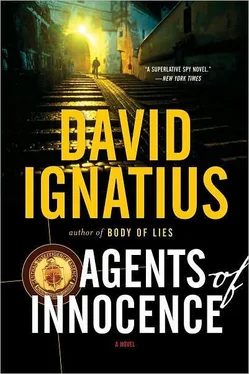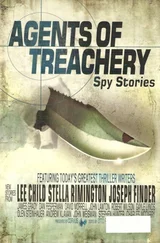David Ignatius - Agents of Innocence
Здесь есть возможность читать онлайн «David Ignatius - Agents of Innocence» весь текст электронной книги совершенно бесплатно (целиком полную версию без сокращений). В некоторых случаях можно слушать аудио, скачать через торрент в формате fb2 и присутствует краткое содержание. Жанр: Шпионский детектив, на английском языке. Описание произведения, (предисловие) а так же отзывы посетителей доступны на портале библиотеки ЛибКат.
- Название:Agents of Innocence
- Автор:
- Жанр:
- Год:неизвестен
- ISBN:нет данных
- Рейтинг книги:3 / 5. Голосов: 1
-
Избранное:Добавить в избранное
- Отзывы:
-
Ваша оценка:
- 60
- 1
- 2
- 3
- 4
- 5
Agents of Innocence: краткое содержание, описание и аннотация
Предлагаем к чтению аннотацию, описание, краткое содержание или предисловие (зависит от того, что написал сам автор книги «Agents of Innocence»). Если вы не нашли необходимую информацию о книге — напишите в комментариях, мы постараемся отыскать её.
Agents of Innocence — читать онлайн бесплатно полную книгу (весь текст) целиком
Ниже представлен текст книги, разбитый по страницам. Система сохранения места последней прочитанной страницы, позволяет с удобством читать онлайн бесплатно книгу «Agents of Innocence», без необходимости каждый раз заново искать на чём Вы остановились. Поставьте закладку, и сможете в любой момент перейти на страницу, на которой закончили чтение.
Интервал:
Закладка:
The seduction began as Rogers sat there on the couch, the vellum notepaper in his hand, imagining Solange. He could see her body. The long curves of her legs, the gentle slope of her thighs, the fullness of her breasts, the radiance of her face. The scent of her body, not just the perfume bought in Paris, but the fragrance of olive and jasmine on her skin. The look of her eyes, so deep and dark, inviting pleasure and seduction.
There was a sound on the stairs. Rogers turned and saw her walking toward him, dressed in a silk robe, even more beautiful than he had imagined. Her lips were open in the shape of a kiss. She walked toward Rogers silently, took his hand in hers, and led him to a room that had once been the library, but had now been made over into a kind of harem chamber. There were no couches, only large pillows on the floor. A broad shaft of light streamed through the filmy curtains that covered the windows, and there was a slight breeze blowing.
Solange closed the door and locked it. Rogers moved toward her hungrily, but she held up a finger, bidding him to stop. I will take you, her eyes said. She took his hand and led him to one of the large pillows and bade him sit down. She took his shoes off, one by one. Then his socks. She unbuttoned his shirt, one button at a time, then gently unfastened his trousers. She was a courtesan now, kneeling gracefully on the floor before Rogers. As she leaned toward him, Rogers glimpsed through her silk robe the curve of her breasts. She was all softness.
When Rogers was naked, Solange rose from the floor and stood silently before him. She slid the silk robe off her shoulders so that it clung briefly to her breasts and then fell gently to the floor. She was perfectly naked except for a gold chain around her waist, hanging low on the curve of her belly.
Rogers thought momentarily of the consequences of this act of pleasure and disorder. But only a moment.
“Come to me,” said Solange Jezzine as she arranged herself on one of the fat pillows on the floor. And Rogers did. He surrendered himself entirely to the woman, her beauty, her eroticism. He closed his eyes and felt a wave of pleasure. It was a heady feeling, like falling from a great height in a dream.
PART IX
June 1978-January 1979
40
Washington; June 1978
“The most competent intelligence service in the world today is the Mossad,” proclaimed John Marsh from the podium of a small conference hall in Arlington, Virginia. “It pains me to say that after all these years, but it’s true.”
There was a burst of applause from the audience of conservative intellectuals, Republican congressional aides, trusted diplomats, and former intelligence officers who had gathered for a conference hosted by the Center for the Study of Responsive Intelligence. The Center was a sort of organized cheerleading section for the old-boy network of the Central Intelligence Agency. It seemed to exist chiefly for the purpose of holding conferences to excoriate the current CIA management, especially the new Director, Charles “Chuck” Hinkle.
The topic of this particular gathering was “Rebuilding the CIA: How and Why.” John Marsh-recently retired from the agency-was the featured speaker. Dressed in a blue pinstripe suit, his hair slicked back against his head, Marsh looked slightly like a gangster. He wagged a finger at his audience as he continued with his lecture.
“You all know what has happened to CIA,” Marsh admonished them. “The agency has been raked over the coals by its critics. Its secrets have been exposed for all the world to see. It is the laughing stock of the other Western intelligence agencies. It is a sad, sad story.
“Certainly there were misdeeds in the past. Certainly there were some overzealous officers and unwise operations. And certainly there are things that need to be corrected. Nobody questions that. There is always room for improvement. But can’t we all agree that there are limits to responsible criticism? Shouldn’t our critics in Congress and the press remember that without a strong intelligence agency, they wouldn’t have the freedom to be so critical?”
There was more applause from the audience. A twenty-five-year-old congressional aide, dressed in a green Dartmouth blazer, shouted “Hear! Hear!” Marsh realized that he was rather enjoying his new life as a public speaker.
“I would like to share a little secret of my own with this group,” said Marsh. “Nothing classified, of course. I wouldn’t do that, not even for a gathering of friends. But I would like to tell you, in my own words, why I left the CIA several months ago after nearly twenty years with the agency.
“As many of you know, I spent most of the 1970s working on congressional liaison for the agency. Our office tried to keep Congress from opening Pandora’s box, and I must admit to you that we failed. They asked for our dirty linen and, despite the efforts of some of us, the agency gave it to them. Do you know what bothered me most? The fact that we lacked political leadership-in Congress, in the White House, and yes, even at the CIA-that was willing to say no.”
There was more applause.
“So after watching this process of self-flagellation, I decided that enough was enough, and I got out.”
More applause. Marsh nodded his head in gratitude.
What Marsh said was not precisely true, at least not the part about leaving the agency. It was true that he had spent the 1970s in the backwater of congressional liaison after he was dumped as operations chief of the Near East Division. But he had done poorly even at that modest job. His colleagues complained that he was successful only in dealing with the most conservative members of the House and Senate-preaching, as it were, to the converted. So Marsh was removed from congressional liaison, brought back to Langley in a dead-end desk job in the Office of Security. And finally, when he neared the twenty-year mark, Marsh was offered early retirement with a generous pension, and took it.
“What we see at the CIA is just another example of our national disorder,” continued Marsh. “We see it in every area of our national life. There is a lack of discipline in our schools, on college campuses, in the news media. There is a lack of control. A feeling of drift and uncertainty. A feeling that we’re being pushed around at home and abroad.”
Marsh was nearing the end of his speech. He put his hands on either side of the lectern, like a sea captain holding the wheel steady in rough seas. Though his audience didn’t know it, he-John Marsh-knew what he was talking about when he spoke of the anarchy of the times. His own family was in chaos. His daughter had dropped out of college to join a commune. His son had been expelled from private school because he was caught using drugs.
But John Marsh wasn’t talking about his own problems that day, he was talking about America’s.
“We need to stand firm,” said Marsh. “We need to stop the decay. And the place to begin is with our intelligence agencies, which are the sword and shield that protect our freedoms.”
There was loud and sustained applause, followed by many congratulatory remarks from people who gathered around the podium. A conservative newspaper columnist asked Marsh for a copy of the speech. The director of the Center for the Study of Responsive Intelligence suggested the possibility of Marsh joining his staff. A professor approached Marsh and asked for his help with a book he was writing about Soviet intelligence operations.
The scene testified to one truth about Washington in the late 1970s. The conservatives had learned the arts of leaking and self-promotion. And in the process, some of the old discipline had gone. The conservative intelligence officers who had spent their careers protecting the nation’s secrets were now, in retirement, spending their days taking journalists to lunch, issuing learned reports on intelligence matters for friendly think tanks, writing position papers for political candidates. Something had come unstuck.
Читать дальшеИнтервал:
Закладка:
Похожие книги на «Agents of Innocence»
Представляем Вашему вниманию похожие книги на «Agents of Innocence» списком для выбора. Мы отобрали схожую по названию и смыслу литературу в надежде предоставить читателям больше вариантов отыскать новые, интересные, ещё непрочитанные произведения.
Обсуждение, отзывы о книге «Agents of Innocence» и просто собственные мнения читателей. Оставьте ваши комментарии, напишите, что Вы думаете о произведении, его смысле или главных героях. Укажите что конкретно понравилось, а что нет, и почему Вы так считаете.












